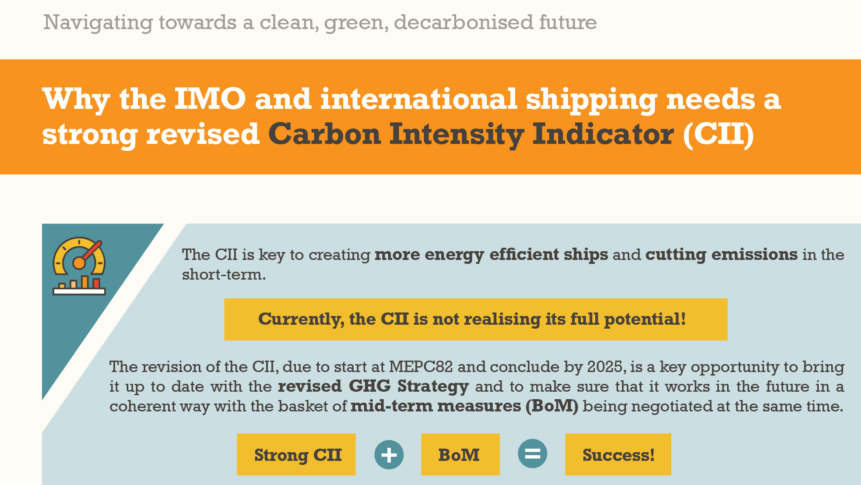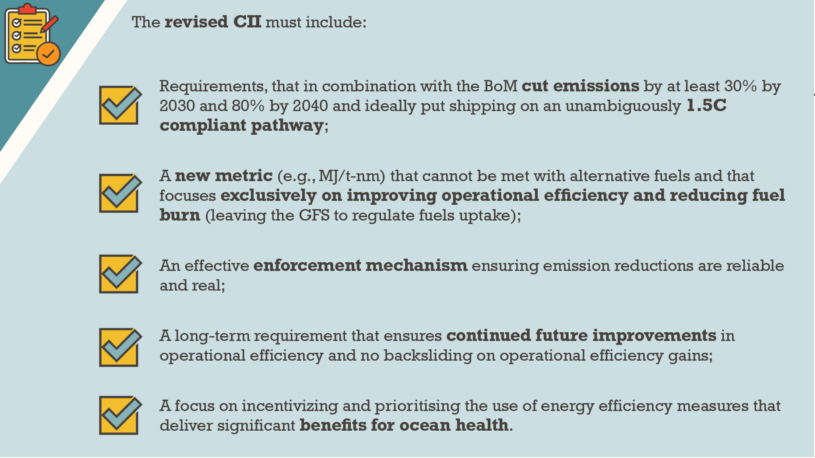IMO’s energy efficiency standard welcome, but further actions to cut GHG emissions needed

The Clean Shipping Coalition welcomes the adoption by the International Maritime Organisation (IMO) of an Energy Efficiency Design Index (EEDI) regulation for new ships, but warns that it’s only the first step in what needs to be a far more expansive effort to address shipping’s climate impacts. [1]
The regulation will only guarantee emissions reductions after 2019, as a handful of developing states led by China and Brazil secured a delay in implementation claiming the need for more time to acquire advanced technologies despite the fact that many of the most efficient ships are already being built in developing countries.
After more than 10 years of inaction the EEDI regulations are a welcome first initiative by the IMO on ship GHG emissions but a collection of additional market-based and operational measures such as emissions trading, a levy, speed limits and mandatory cuts is very much needed, and the IMO must address these issues with greater urgency.
Shipping accounts for around 3.3 percent of man-made CO2 emissions worldwide and this figure will rise to 6% in 2020. According to the IMO’s 2009 GHG study, [2] if nothing is done, ship emissions could grow by 150 percent to 250 percent by 2050.
The IMO’s Energy Efficiency Design Index (EEDI) will require new ships to meet a minimum level of energy efficiency: ships built between 2015 – 2019 will need to improve their efficiency by 10%, rising to 15-20 percent between 2020 and 2024, depending on the ship type, and 30 percent for ships delivered after 2024. However, after intense negotiations, efforts led by China, Brazil, Saudi Arabia and South Africa resulted in a waiver for new ships registered in developing countries. If countries choose to apply the waiver for a newly delivered ship, application of the EEDI will be delayed for 6.5 years from the 01 January 2013 entry into force of the regulation. There is a significant danger that many shipowners will elect to have their new ships flagged in countries that provide a waiver. The first guaranteed effective date of the EEDI as a global shipping efficiency standard would thus be 2019.
Environmental NGOs caution that because the standard only applies to ships replacing older ones at the end of their very long lives (typically 30 years), and because the waiver will defer implementation for many new ships, the full effects of today’s decision will take a very long time to have any significant impact.
Bill Hemmings of Transport & Environment said: “Adopting the EEDI is the right step but the long delay weakens its short to medium term impact significantly. If the IMO does not deliver action quickly now on existing ships, it will be up to the EU to take the lead at a regional level”.
John Maggs from Seas At Risk said: “This decision is one small but significant step in tackling GHG emissions from shipping. The shipping industry has to play a proper role in keeping global warming below dangerous levels. Adoption of the EEDI must mark the start of a period of renewed action at the IMO with a focus on achieving fast, deep cuts in emissions”.
“The International Maritime Organisation is moving at a glacial speed to reduce greenhouse gas emissions effectively. Passing an efficiency standard and merely discussing market-based measures in meetings isn’t enough — countries need to take further concrete actions in their own regional policies,” said Jenny Cooper of Environmental Defense Fund.
“This much delayed action puts into question if the IMO wants to be part of the solution in a carbon constrained future or risk becoming climate laggards,” says Svend Soeyland (International climate policy adviser) with the Belllona Foundation.
“The EEDI vote is bittersweet,” said Jacqueline Savitz, senior campaign director for Oceana. “There will be no change to existing ships which are currently pumping a billion tonnes of CO2 each year, and for new ships it will take another dozen years until the EEDI is really delivering benefits. Operational changes could be delivering major benefits today. The United States should stop hiding behind the IMO and begin to regulate shipping emissions,” she added.
Notes to editors:
[1] The vote, at the IMO’s Marine Environment Protection Committee (MEPC) in London, was approved by a majority of 49 countries in favour, 5 against and 2 abstentions. For a briefing on the EEDI see:
http://www.transportenvironment.org/Publications/prep_hand_out/lid/646
[2] http://www5.imo.org/SharePoint/mainframe.asp?topic_id=1823


